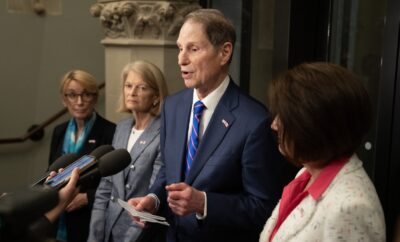U.S. senator in Ottawa urges Carney to quickly repeal digital services tax
By Canadian Press on July 21, 2025.

OTTAWA — A U.S. senator is calling on Prime Minister Mark Carney to move quickly on repealing the digital services tax.
“You all, to your credit, said you’re not going to collect it. I asked that Canada move as quickly as possible to get a law passed in Parliament making sure that it’s gone permanently,” Ron Wyden, a Democratic senator from Oregon, told media Monday following a meeting between Carney and a bipartisan delegation of four U.S. senators in Ottawa.
“The prime minister was receptive to that,” Wyden added. “He said he would get on it in the fall.”
Carney said in late June he would eliminate the tax — just before a hefty retroactive payment was due that would have cost big U.S. tech companies an estimated $2 billion.
The move came after U.S. President Donald Trump called a halt to bilateral trade talks over the tax, which would have imposed a three per cent levy on tech giants that generate revenue from Canadian users, such as Google, Amazon and Uber.
While the Canada Revenue Agency is not asking for payments to be made through the tax, it has said it will not issue refunds to those who have already paid until Parliament passes a law formally ending the tax. Google also has said it will wait until that law is passed before refunding customers who paid a surcharge it imposed last year in response to the tax.
The House of Commons is currently on summer break and is set to return on Sept. 15.
The senators — wearing Canada-U.S. friendship bracelets provided by the U.S. Embassy — were in Ottawa to discuss the ongoing trade conflict between the two countries.
Wyden said the senators were there “to talk about making sure that in the days ahead we build on a productive economy for Canada and the United States.”
“And we are bridge builders, not people who throw wrenches,” he added.
Wyden said there was progress in the discussions Monday. “I felt that this was very constructive … and we had concrete ideas where both sides are looking like they want to pursue constructive solutions.”
In addition to Wyden, the delegation included Democratic senators Maggie Hassan of New Hampshire and Catherine Cortez Masto of Nevada, and Republican Lisa Murkowski of Alaska.
Wyden said he also brought up softwood lumber, a long-standing trade irritant between Canada and the United States.
“And I think we now have a clear idea of how to proceed, and that’s to build around some sort of quota arrangement,” he said.
Hassan told reporters the senators also spoke to Carney about “the things we can do together to stop the flow of the precursor chemicals that are used to make fentanyl to our countries.”
Carney, who did not stop to talk to reporters after the meeting, remarked that it was a “very good” discussion.
In a letter to Carney on July 10, Trump threatened to impose 35 per cent tariffs on Canadian goods by Aug. 1, setting a new deadline for trade talks that were supposed to wrap up by now.
On Monday, the senators didn’t answer when asked whether a deal is likely by Aug. 1.
Carney told reporters last week that a trade deal with the U.S. will likely include some tariffs, and that he expects talks to “intensify” ahead of the Aug. 1 deadline.
Asked about the prospect of a tariff-free deal, Murkowski told reporters in Ottawa that is being “left to the hands right now of those that are negotiating.”
“Everything that we know is that these negotiations have been very tightly, very closely held,” she said. “We all want to get to August 1 and beyond with a resolve that works for Canada and works for the United States.”
U.S. Commerce Secretary Howard Lutnick told an American television audience on Sunday that Canada will pay tariffs unless it opens its market to the United States.
Members of Trump’s administration have started to signal that there will not be an avalanche of trade deals ahead of the August deadline the president set in letters to national governments around the world.
U.S. Treasury Secretary Scott Bessent told media outlet CNBC on Monday that “talks are moving along but the important thing here is the quality of the deal and not the timings of the deals.”
“President Trump has created maximum leverage — as only he can do — and what we are seeing is these imbalances built up over 20, 30, 40 years and we are more concerned with high-quality deals then getting these deals done by Aug. 1,” he said.
— With files from Kelly Geraldine Malone in Washington
This report by The Canadian Press was first published July 21, 2025.
Anja Karadeglija, The Canadian Press
31-30




